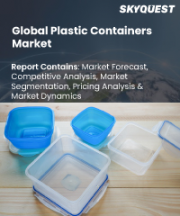
|
시장보고서
상품코드
1790058
미국의 접이식 및 조립식 컨테이너 시장 규모, 점유율, 동향 분석 보고서 : 재료별, 제품 유형별, 최종 용도별, 부문별 예측(2025-2033년)U.S. Foldable And Collapsible Container Market Size, Share & Trends Analysis Report By Material (Plastic, Metal, Wood), By Product Type (Bulk Bins, Pallets, Crates, Boxes, Cartons), By End Use, And Segment Forecasts, 2025 - 2033 |
||||||
미국의 접이식 및 조립식 컨테이너 시장 개요
미국의 접이식 및 조립식 컨테이너 시장 규모는 2024년에 4억 2,280만 달러로 추정되며 2033년에는 5억 7,950만 달러에 달할 것으로 예상되며 2025년부터 2033년까지 3.6%의 연평균 복합 성장률(CAGR)을 보일 것으로 예측됩니다. 온라인 소매업의 급격한 성장과 보관 및 운송 비용 절감의 필요성으로 인해 창고 공간과 빈 컨테이너의 왕복 이동을 줄여주는 접이식 컨테이너에 대한 수요가 크게 증가하고 있습니다.
미국의 접이식 컨테이너 산업은 주로 물류 및 공급망 운영의 비용 효율성과 지속가능성에 대한 필요성에 의해 주도되고 있습니다. 기존의 운송용 컨테이너는 비어있는 상태에서 큰 공간을 차지하여 운송 및 보관 비용 상승으로 이어집니다. 접이식 컨테이너는 이 문제를 해결하고, Staxxon이나 Singamas와 같이 공간 사용을 최소화하는 접이식 디자인을 제공하는 기업에서 볼 수 있듯이, 빈 컨테이너의 반송 물류 비용을 최대 75%까지 절감할 수 있습니다. 또한, E-Commerce와 적시 배송 모델의 부상으로 인해 유연한 패키징 솔루션에 대한 수요가 증가하여 시장 성장을 더욱 촉진하고 있습니다.
또 다른 중요한 요인은 환경의 지속가능성을 중시하는 경향이 강해지고 있다는 점입니다. 접이식 컨테이너는 화물 공간 최적화, 연료 소비 감소, 빈 컨테이너 재배치에 필요한 이동 횟수 감소로 탄소발자국을 줄일 수 있습니다. 예를 들어, Maersk는 효율성을 높이고 ESG 목표를 달성하기 위해 접이식 컨테이너를 채택하고 있습니다. EPA의 SmartWay 프로그램 등 친환경 물류를 촉진하는 정부 규제 역시 배출량 감축 목표를 준수하기 위해 접이식 컨테이너의 도입을 장려하고 있습니다. 이는 기업의 지속가능성에 대한 노력과 일치하기 때문에 아마존이나 월마트와 같은 대형 소매업체에게 접이식 솔루션은 매력적으로 다가옵니다.
또한, 재료 과학과 스마트 컨테이너 기술의 발전으로 시장 도입이 가속화되고 있습니다. 최신 접이식 컨테이너는 골판지 플라스틱이나 강화 강철 합금과 같은 고강도 경량 소재를 사용하여 유연성을 유지하면서 내구성을 향상시켰습니다. 철도, 도로, 해상화물을 결합한 복합운송의 성장도 복합운송을 간소화하는 접이식 컨테이너에 유리합니다.
목차
제1장 조사 방법과 범위
제2장 주요 요약
제3장 미국의 접이식 및 조립식 컨테이너 시장 변수, 동향, 범위
- 시장 계통 전망
- 침투와 성장 전망 매핑
- 업계 밸류체인 분석
- 원재료 동향
- 제조/기술 동향
- 규제 프레임워크
- 시장 역학
- 시장 성장 촉진요인 분석
- 시장 성장 억제요인 분석
- 시장 기회 분석
- 시장 과제 분석
- 비즈니스 환경 분석
- Porter's Five Forces 분석
- PESTEL 분석
제4장 미국의 접이식 및 조립식 컨테이너 시장 : 재료 추정·동향 분석
- 중요한 포인트
- 물질 변동 분석과 시장 점유율, 2024년과 2033년
- 플라스틱
- 금속
- 목재
- 기타
제5장 미국의 접이식 및 조립식 컨테이너 시장 : 제품 유형 추정·동향 분석
- 중요한 포인트
- 제품 유형 변동 분석과 시장 점유율, 2024년과 2033년
- 벌크 빈
- 팔레트
- 나무 상자
- 박스
- 카톤
- 기타
제6장 미국의 접이식 및 조립식 컨테이너 시장 : 최종 용도 추정·동향 분석
- 중요한 포인트
- 최종 용도 변동 분석과 시장 점유율, 2024년과 2033년
- 산업·자동차
- 식품·의료
- 의약품·화학
- 건설·건축
- 기타
제7장 경쟁 구도
- 주요 기업과 최근 동향, 그리고 업계에 대한 영향
- 기업 분류
- 기업의 시장 포지션 분석
- 기업 히트맵 분석
- 전략 매핑
- 확장
- 인수합병
- 협업
- 신제품 유형 발매
- 기타
제8장 기업 리스트(개요, 재무 실적, 제품 유형 개요)
- Schoeller Allibert
- 기업 개요
- 재무 실적
- 제품 유형 벤치마크
- WestRock Company
- Flexible Packaging Solutions
- CHEP
- Flex Container
- ORBIS Corporation
- Singamas Container Holdings Limited
- RPP Containers
- Compact Container Systems (CCS)
- Corplex
U.S. Foldable And Collapsible Container Market Summary
The U.S. foldable and collapsible container market size was estimated at USD 422.8 million in 2024 and is projected to reach USD 579.5 million by 2033, growing at a CAGR of 3.6% from 2025 to 2033. Rapid growth in online retail and a need to cut storage and transport costs have significantly increased demand for foldable containers that reduce warehouse space and empty return trips
The U.S. foldable and collapsible container industry is primarily driven by the need for cost efficiency and sustainability in logistics and supply chain operations. Traditional shipping containers occupy significant space when empty, leading to higher transportation and storage costs. Foldable containers address this issue by reducing empty return logistics costs by up to 75%, as seen in companies such as Staxxon and Singamas, which offer collapsible designs that minimize space usage. In addition, the rise in e-commerce and just-in-time delivery models has increased demand for flexible packaging solutions, further propelling market growth.
Another key factor is the growing emphasis on environmental sustainability. Foldable containers reduce carbon footprints by optimizing cargo space, lowering fuel consumption, and decreasing the number of trips required for empty container repositioning. For instance, Maersk has adopted collapsible containers to enhance efficiency and meet ESG goals. Government regulations promoting green logistics, such as the EPA's SmartWay Program, also encourage businesses to adopt foldable containers to comply with emission reduction targets. This aligns with corporate sustainability initiatives, making foldable solutions attractive to major retailers like Amazon and Walmart.
Moreover, advancements in material science and smart container technologies are accelerating market adoption. Modern foldable containers use high-strength, lightweight materials like corrugated plastic and reinforced steel alloys, improving durability while maintaining flexibility. The growth of intermodal transportation-combining rail, road, and sea freight- also favors foldable containers, as they streamline cross-modal transitions.
U.S. Foldable And Collapsible Container Market Report Segmentation
This report forecasts revenue growth at a country level and provides an analysis of the latest industry trends in each of the sub-segments from 2021 to 2033. For this study, Grand View Research has segmented the U.S. foldable and collapsible container market report based on material, product type, and end use:
- Material Outlook (Revenue, USD Million, 2021 - 2033)
- Plastic
- Metal
- Wood
- Others
- Product Type Outlook (Revenue, USD Million, 2021 - 2033)
- Bulk Bins
- Pallets
- Crates
- Boxes
- Cartons
- Others
- End Use Outlook (Revenue, USD Million, 2021 - 2033)
- Industrial & Automotive
- Food & Beverage
- Pharmaceutical & Chemical
- Construction & Building
- Others
Table of Contents
Chapter 1. Methodology and Scope
- 1.1. Research Methodology
- 1.1.1. Market Segmentation
- 1.1.2. Market Definition
- 1.2. Research Scope & Assumptions
- 1.3. Information Procurement
- 1.3.1. Purchased Database
- 1.3.2. GVR's Internal Database
- 1.3.3. Secondary Sources & Third-Party Perspectives
- 1.3.4. Primary Research
- 1.4. Information Analysis
- 1.4.1. Data Analysis Models
- 1.5. Market Formulation & Data Visualization
- 1.6. Data Validation & Publishing
- 1.7. List of Abbreviations
Chapter 2. Executive Summary
- 2.1. Market Snapshot, 2024 (USD Million)
- 2.2. Segmental Snapshot
- 2.3. Competitive Landscape Snapshot
Chapter 3. U.S. Foldable and Collapsible Container Market Variables, Trends, and Scope
- 3.1. Market Lineage Outlook
- 3.2. Penetration & Growth Prospect Mapping
- 3.3. Industry Value Chain Analysis
- 3.3.1. Raw Material Trends
- 3.3.2. Manufacturing/Technology Trends
- 3.4. Regulatory Framework
- 3.5. Market Dynamics
- 3.5.1. Market Driver Analysis
- 3.5.2. Market Restraint Analysis
- 3.5.3. Market Opportunity Analysis
- 3.5.4. Market Challenge Analysis
- 3.6. Business Environment Analysis
- 3.6.1. Porter's Five Forces Analysis
- 3.6.2. PESTEL Analysis
Chapter 4. U.S. Foldable and Collapsible Container Market: Material Estimates & Trend Analysis
- 4.1. Key Takeaways
- 4.2. Material Movement Analysis & Market Share, 2024 & 2033
- 4.2.1. Plastic
- 4.2.1.1. Market estimates and forecasts, 2021 - 2033 (USD Million)
- 4.2.2. Metal
- 4.2.2.1. Market estimates and forecasts, 2021 - 2033 (USD Million)
- 4.2.3. Wood
- 4.2.3.1. Market estimates and forecasts, 2021 - 2033 (USD Million)
- 4.2.4. Others
- 4.2.4.1. Market estimates and forecasts, 2021 - 2033 (USD Million)
- 4.2.1. Plastic
Chapter 5. U.S. Foldable and Collapsible Container Market: Product Type Estimates & Trend Analysis
- 5.1. Key Takeaways
- 5.2. Product Type Movement Analysis & Market Share, 2024 & 2033
- 5.2.1. Bulk Bins
- 5.2.1.1. Market estimates and forecasts, 2021 - 2033 (USD Million)
- 5.2.2. Pallets
- 5.2.2.1. Market estimates and forecasts, 2021 - 2033 (USD Million)
- 5.2.3. Crates
- 5.2.3.1. Market estimates and forecasts, 2021 - 2033 (USD Million)
- 5.2.4. Boxes
- 5.2.4.1. Market estimates and forecasts, 2021 - 2033 (USD Million)
- 5.2.5. Cartons
- 5.2.5.1. Market estimates and forecasts, 2021 - 2033 (USD Million)
- 5.2.6. Others
- 5.2.6.1. Market estimates and forecasts, 2021 - 2033 (USD Million)
- 5.2.1. Bulk Bins
Chapter 6. U.S. Foldable and Collapsible Container Market: End Use Estimates & Trend Analysis
- 6.1. Key Takeaways
- 6.2. End Use Movement Analysis & Market Share, 2024 & 2033
- 6.2.1. Industrial & Automotive
- 6.2.1.1. Market estimates and forecasts, 2021 - 2033 (USD Million)
- 6.2.2. Food & Beverage
- 6.2.2.1. Market estimates and forecasts, 2021 - 2033 (USD Million)
- 6.2.3. Pharmaceutical & Chemical
- 6.2.3.1. Market estimates and forecasts, 2021 - 2033 (USD Million)
- 6.2.4. Construction & Building
- 6.2.4.1. Market estimates and forecasts, 2021 - 2033 (USD Million)
- 6.2.5. Others
- 6.2.5.1. Market estimates and forecasts, 2021 - 2033 (USD Million)
- 6.2.1. Industrial & Automotive
Chapter 7. Competitive Landscape
- 7.1. Key Players & Recent Developments & Their Impact on the Industry
- 7.2. Company Categorization
- 7.3. Company Market Position Analysis
- 7.4. Company Heat Map Analysis
- 7.5. Strategy Mapping
- 7.5.1. Expansions
- 7.5.2. Mergers & Acquisitions
- 7.5.3. Collaborations
- 7.5.4. New Product Type Launches
- 7.5.5. Others
Chapter 8. Company Listing (Overview, Financial Performance, Product Types Overview)
- 8.1. Schoeller Allibert
- 8.1.1. Company Overview
- 8.1.2. Financial Performance
- 8.1.3. Product Type Benchmarking
- 8.2. WestRock Company
- 8.3. Flexible Packaging Solutions
- 8.4. CHEP
- 8.5. Flex Container
- 8.6. ORBIS Corporation
- 8.7. Singamas Container Holdings Limited
- 8.8. RPP Containers
- 8.9. Compact Container Systems (CCS)
- 8.10. Corplex
(주말 및 공휴일 제외)


















